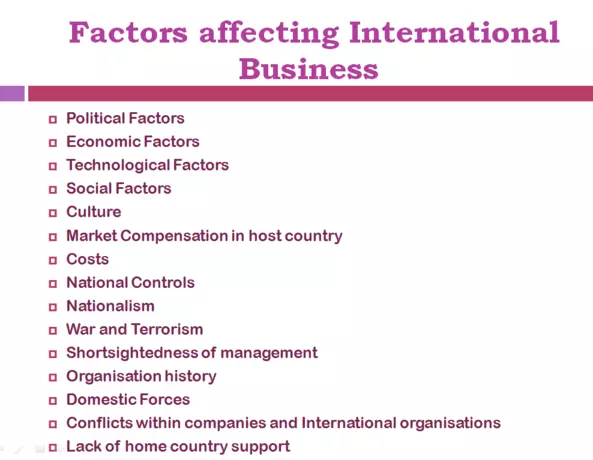Factors Affecting International Business
Factors Affecting International Business – Many factors have a great influence on international business.
Different factors that affect an international business are as follows:
- Political Factors
- Economic Factors
- Technological Factors
- Social Factors
- Culture
- Market Competition in Host Country
- Costs
- National Controls
- Nationalisation
- War and Terrorism
- Shortsightedness of Management
- Organisation History
- Domestic Forces
- Conflict within Companies and International Organisations
- Lack of Home Country Support
1) Political Factors
These factors concern government policies, laws and administrative orientations of different countries and regional economic blocks. Political factors form the basis for regulating international trade concerning tariffs, quotas and technical standards. Countries with a strong business sector have different political priorities that either help or hinder the country’s ability to conduct international trade.
2) Economic Factors
Any business’ success is tied to the health of the economy, which in turn affects the demand for your goods and services in international markets. The level of demand for goods or services in international markets is influenced by rates of economic growth. However, economic growth rates may be high in some nations and low in others. For example, the 2010-2012 Eurozone debt crisis slowed down economic growth in many European countries at a time when nations in other areas were experiencing an economic boom.
Some economic factors that have a direct impact on international business include the following points:-
- Fiscal policy
- Interest rates
- Inflation rates
- Employment level
- Income distribution
- Demand for various products
- Value of the country’s currency
- Allocation of government budget
- The purchasing power of the customers
3) Technological Factors
Technology availability and the technical capabilities of multinational companies play an important role in determining corporate prosperity in host countries. Factors such as broadband connectivity and technical training have become important components of successful operations in the modern business world. Moreover, the levels of technological development in a given country determine the scope of technical understanding among its population. While it may be easier to develop and maintain high-technology operations in countries with a strong technological base, the same cannot be said for low-tech nations.
4) Social Factors
Demographic factors such as religion and culture affect the quality, types, functional features and demand levels of your products in international markets. Social factors such as awareness, education, and the trends in society have an impact on consumer behaviour when it comes to purchasing various goods and services. Cultures attach different meanings to time, objects, names, colours and attitudes. For example, General Motors experienced low sales when it introduced the Nova car in Latin American markets because the car name translated to “it does not move” in Spanish. Therefore, multinational corporations must be able to understand, interpret and respond to cultural nuances and patterns that are characteristic of the international business environment.
5) Culture
The culture of the nation and the companies should have a global outlook. The companies should have the long-term perspective of moving where the market opportunities are good for long-term success. The inward-looking culture makes companies remain local. For example, unlike Korean companies who look for global markets LG, Samsung, and Indian companies, Hindustan Motor was inward looking.
Related Articles:
- nature of business meaning
- nature of international business
- scope of international marketing
- determinants of economic development
- nature of capital budgeting
- nature of international marketing
6) Market Competition in the Host Country
If the best companies from around the world enter a market, it leads to intense competition and some less effective companies will have to go out of business or have no choice but to shutter their doors. For example, Daewoo cars in India.
7) Costs
The competition calls for marketing and producing high-quality products at reasonable prices. If prices are high, then the market rejects the products. For example, ‘Samay’ timepieces could not stand the global competition as the Chinese offered the same quality at half the prices.
8) National Controls
The nations build barriers for outside country manufacturers by increasing trade barriers. Trade barriers will be direct through high customs duties. Indirect barriers will be licensing procedures, quota system, certification, inspection, and tedious paperwork. For example, India and former Russia were inward-looking economies for five decades with large trade barriers until 1990.
9) Nationalisation
Nations that have distinct ideological beliefs often do not trade with each other. For example, many nations do not trade with Israel and the U.S. with Iran.
10) War and Terrorism
The political uncertainties and war-like situations are blockages to the growth of trade. For example, Trade between India and Pakistan does not exist for 50 years although they are adjoining neighbours and were one country before August 1947.
11) Shortsightedness of Management
Sometimes management ignores vast business opportunities across national borders. The companies do not wish to expand beyond the borders of their country. If a company does not adapt to local circumstances, it does not survive. For example, Parker Pen company in the U.K. did not adapt to local conditions hence the company was sold.
12) Organisation History
Some companies are contended and like to remain within a nation. For example, many public sector companies of the Government of India.
13) Domestic Forces
The government or social restrictions imposed on commerce and industry become hurdles in a company going global. For example: Hindustan Aeronautics Limited (HAL) serves exclusively the Indian Air Force.
14) Conflict within Companies and International Organisations
Differences of opinion in strategies adopted between different levels of management in international business or subsidiary working is a cause of failures.
15) Lack of Home Country Support
Home country support for export investments and tax matters is essential for the success of international business. If support is sufficient, the international business proposal succeeds.

Information Technology in International Business
Doing business and marketing in a global environment has its challenges. When people from distinct national cultures interact with each other, they are confronted with unfamiliar interaction patterns and communication styles, different business goals and logic, all of which may be difficult to deal with or interpret. Cross-cultural communication (also frequently referred to as international communication) is a field of study that looks at how people from differing cultural backgrounds communicate, in similar and different ways among themselves and how they endeavour to communicate across different cultures.
Recent Information Technology (IT) advancements have played the most significant supportive roles in international business. PCs have extensive processing, display, and storage capacity. If any managerial decision is to be taken based on vast amounts of data, it can be done within seconds.
Information technology is largely shared through mobile devices like laptops, PDAs and smartphones are now common in any workplace. These devices allow companies to instantly share updates and new product releases within their company but with affiliates, shareholders, colleagues and competitors anywhere in the world. The speed at which information can be shared via this technology has made international businesses extremely accessible, both to others in the business world and to customers.
The Digital Transformation of International Business
Many companies are changing the way they do business internationally by utilising the latest advancements in information and communication technology. New devices like smartphones and tablet computers, the latest software and media applications, and the popularity of social networking sites make it easy for businesses to communicate with colleagues and customers around the world, evaluate product performance and sales, and market and promote their products more effectively, all of which play an increasingly large role in international business.
Information technology enables the management to solve the problems which are intensified by the international scope of business process in terms of geographical distances, scattered members in a decentralised organisation who need to create and process information in many places and different time zones between senders and recipients of information that pose additional problems. Globalizing companies increase the dynamics and complexity of their relations with the environment. MNCs cannot fully rely on adaptive structural changes due to rapid external changes. They have to organise their business processes to allow greater flexibility. Therefore, MNCs should deliberately design or re-design existing international business processes.
You May Also Like:-
Nature of International Business
